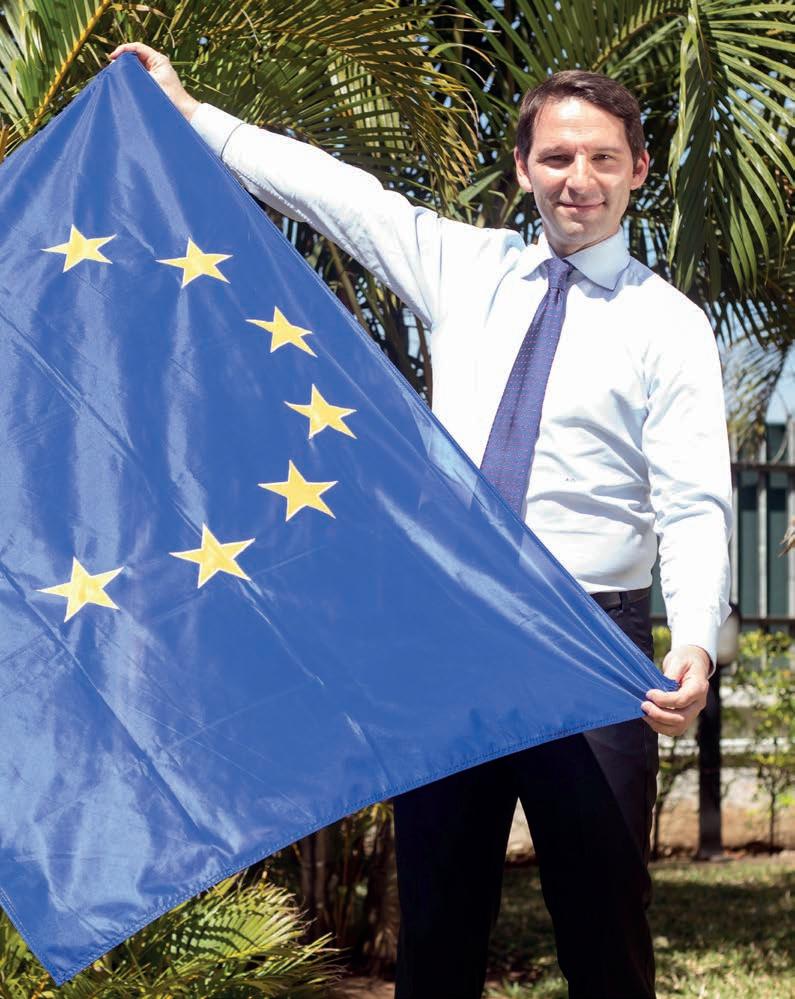
3 minute read
“NEW WAYS OF WORKING”
How Absa is redefining work in Mozambique
New Ways of Working is a concept that gained momentum in the wake of covid-19, when many companies began to implement it to cope with the new pandemic reality. However, a few companies such as Absa Bank Moçambique, recognising the importance of delivering new approaches for the satisfaction and retention of its employees, had already taken the first steps to implement the concept prior to the outbreak of the pandemic.
Advertisement
With a robust and flexible structure, Absa created mechanisms that make a difference in the daily lives of its employees, such as hybrid work, strengthening the philosophy of open space and unassigned desks, as well as leveraging the use of digital tools such as Jabber and MS Teams as means of communication. “We are an organization that rethinks not only the business environment but also its adjacent areas, and if the world has changed, our way of working has to change too. There must be structural flexibility to adjust to the needs of the employees in this VUCA (volatile, uncertain, complex and ambiguous) world, and so we seek, step by step, to contribute to this new way of working, [which is] more collaborative, more autonomous and happier for everyone. This work model requires a lot of discipline from the employees, as they must ensure the sustainability of the business. Only in this way will we remain committed to differentiating our Employee Value Proposition (EVP)”, says Hanifa Hassangy, Director of People and Culture. At the same time, technological evolution and platforms such as MS Teams , Skype, Slack, Zoom and Miro, among others, not to mention SMS, WhatsApp and email, have proven that one no longer needs to be in the office fulltime to be a productive member of the team.
The hybrid model required the Bank to promote a primarily remote and decentralised culture that affords freedom, autonomy and flexibility in working arrangements. In this way and according to their respective roles, employees can choose when and where to work, opting for the work format that best suits their needs – provided that the Bank’s data security policy requirements are all met – thus achieving a better balance between their personal and professional lives.
In this process, in order to facilitate the implementation of hybrid work, Absa ensured that all employees were given structural conditions so that the efficacy of their work was not affected, through the provision of furniture, laptops, fixed Internet and mobile data, among others.
With the implementation of the hybrid model, both the Bank and the employees benefited, because flexibility increased talent retention and team performance. In fact, recent studies by the Harvard Business School prove that companies that adopted more flexible work models increased the productivity of their employees, reduced staff turnover and lowered the costs of the organisation itself.
However, as with all things, changes in the work environment have demanded, and will continue to do so, that the Bank adapts to new working trends and values people’s potential. Absa has continuously invested in process automation and staff training, resorting to the use of new technologies such as Virtual Reality, for example. This innovation, in addition to breaking the distance barrier, has revolutionised the traditional training model, making learning sessions more agile, dynamic, flexible and motivating. Training based on Virtual Reality presents a very high growth potential and evident benefits, both for the Bank and its employees.
These new ways of working have had and will continue to have a positive impact on employees’ lives. They are an implicit proof of mutual trust between employee and employer, providing greater flexibility and autonomy in time management, a better balance between professional and personal life and enriching the content of the work through its diversification. In this way, a culture that is conducive to learning and fosters collaboration is increasingly developed: a culture that instigates employees to want to know more, to develop and to commit, becoming agents of change. “Organisations that focus on people are the ones that get better results and greater commitment and loyalty from them. That is why we are a bank made of people and for people, a bank that places its employees at the centre of its business strategy, regardless of the working model or organisational process adopted”, says Hanifa Hassangy.
Absa has continuously invested in process automation and staff training, resorting to the useof new technologies such as Virtual Reality, for example.
4 MOÇAMBIQUE
EUROPEIA

Uma sólida e longa duração




